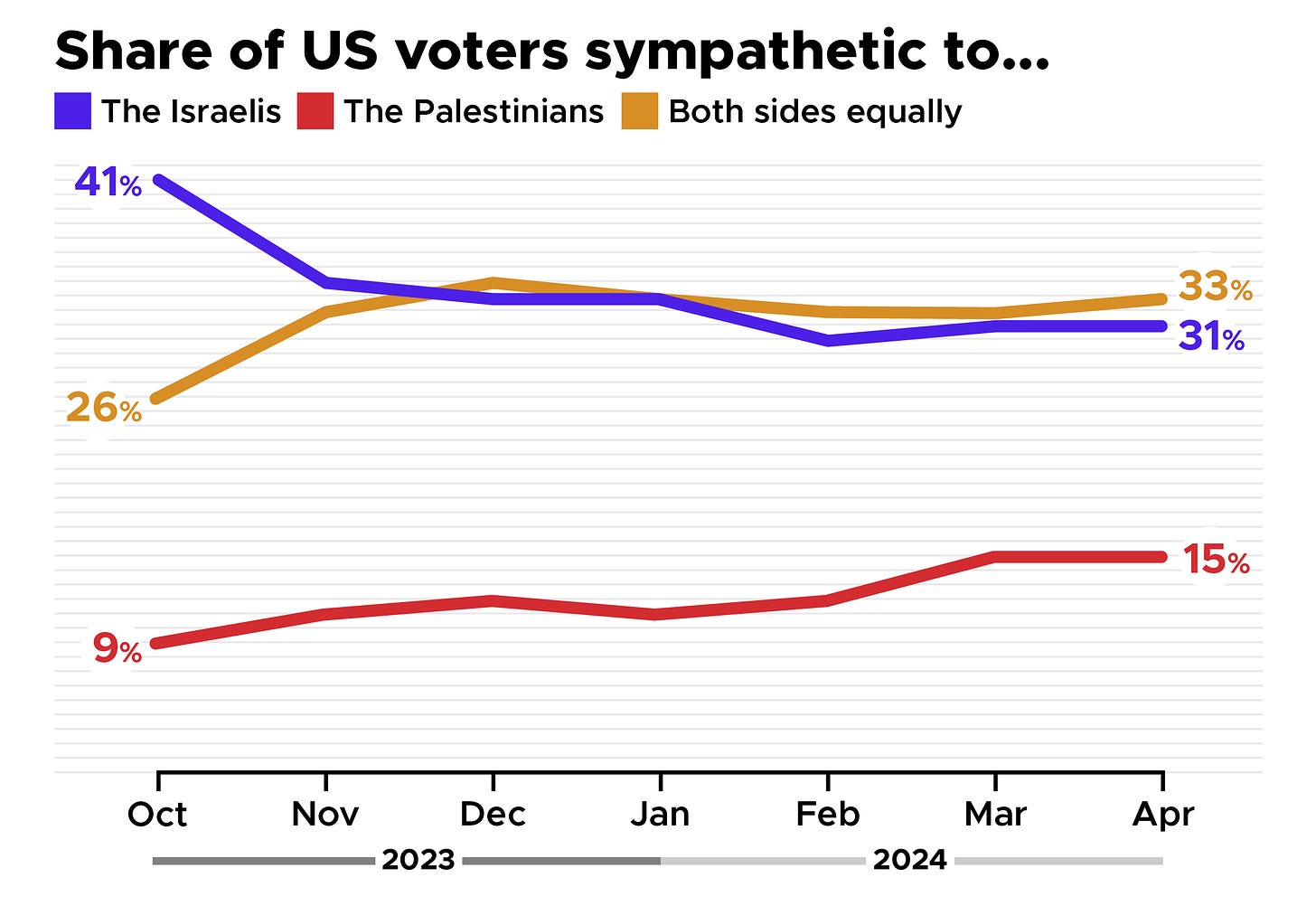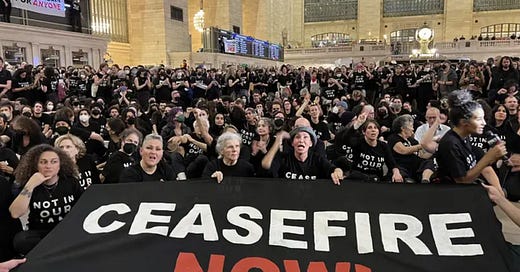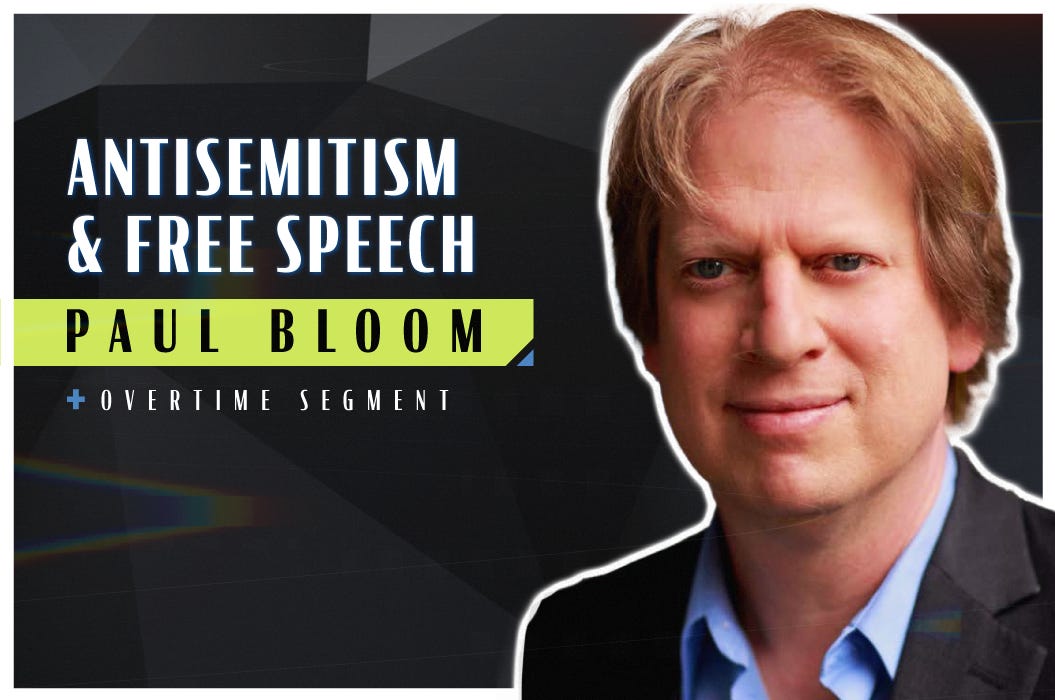Protest Tips from Boomers
Plus: Controlling your social media experience. Apple crushes humanity. Hamas and “ancient hatreds.” Will AI revolutionize social science? Fareed Zakaria slaps down China hawks. And more!
Save the date: We’ll be hosting a Zoom call for paid NZN subscribers next week—on Friday, May 17 at 6 pm US Eastern Time. After a 45-minute Ask-Bob-Anything session, we’ll open the floor to any and all questions about artificial intelligence.
Two weeks ago in this space I drew on dim childhood memories of the Vietnam protests to make the case for a shift in tactics by pro-Palestinian protesters. I was motivated partly by that very phrase: pro-Palestinian protesters. It seemed like only yesterday—or maybe more like six months ago—the protesters were called “pro-ceasefire protesters.” I wrote:
Maybe these protests would be more broadly appealing, and more effective, if they were more like the Vietnam protests—if they kept the anti-war message closer to their core. More than you might think, the protest movement of the 1960s was a coalition, involving different causes and different factions, and even some internal tension. But one message everyone could get behind was “Stop the War!”
That message, to be sure, is still a big part of the protests. I stopped by a campus encampment a couple of weeks ago, and among the chants was, “Not another nickel, not another dollar, no more money for Israel’s slaughter.”
But, on balance, the vibe seemed more about long-term aspirations of Palestinian liberation. And it seemed to me that dialing that vibe down a bit might better serve the short-term needs of Gazans and maybe even those long-term Palestinian aspirations. After all, the more Americans you bring into the pro-peace tent, the bigger the audience you can try to engage in a larger discussion about the longstanding and unconscionable plight of Palestinians living in the West Bank and Gaza—a US-supported and US-subsidized oppression that most Americans still have little real awareness of.
I don’t claim to have special wisdom here—I’m just one boomer, offering guidance to a generation famously disdainful of boomers and their guidance. However, this week three other boomers—all of whom have long been on the stop-this-war bandwagon—weighed in with their own views on how a moderation of message and/or tactics might make these protests more successful: New York Times columnist Nicholas Kristof; Harvard political scientist and Foreign Policy columnist Stephen Walt; and political analyst and 1960s activist John Judis. And one bedrock principle of journalism is that three examples constitute a trend. So I am no longer a mere boomer scold; I am part of a whole wave of boomer scolding. Kids, don’t just get off my lawn—get off our lawn!
And yet, even amid this comforting boomer solidarity, I’ve felt flashes of youth. The reason is that, as I pondered the case for reform being made by my fellow boomers, I imagined what the protesters might say in reply. And, although I still think much of the tactical guidance they’re being offered makes sense, I felt a kind of sympathy for—and even moments of identification with—their inevitable rejection of most if not all of the advice. I’ll try to explain:
Of this week’s three pieces of boomer guidance, Walt’s is the shortest and also the sweetest—I think it will grate less on the sensibilities of protesters than the other two. (To John Judis, my very good friend for lo these many years: I love you, man, but, given that America has supplied the arms that have killed tens of thousands of Gazans, asking the protesters to replace Palestinian flags with American flags is, um, pretty ambitious.) But all three writers evince Walt’s motivating concern—that the protesters, “having successfully focused attention on Israel’s predations and American complicity… may now act in ways that unwittingly undermine the sympathy and support they have garnered.”

Walt focuses on specific disruptive acts that annoy large numbers of people, like halting a graduation ceremony. Kristof seems more worried about defiant encampments and their consequences: “It seems to me that the campus upheavals have distracted from the crisis in Gaza, rather than called attention to it.” And Judis, with the most sweeping indictment, is critical of both the style and substance of the protesters’ messaging. He complains, for example, that protesters “chant slogans such as ‘From the River to the Sea,’ which, if achieved, would mean the elimination of Israel as a state”—and “that is an objective that few Americans embrace.” (Both Judis and Kristof, by the way, are less nostalgic than I about the Vietnam protests, which they see as a cautionary tale. Judis was in the moderate wing of the protests and thinks the radicals made it easier for Nixon to stigmatize the peace movement and thus crush peace candidate George McGovern in the 1972 election.)
Most of this advice makes sense to me, though my concerns about “From the River to the Sea” are slightly different than Judis’s. He’s right about its practical implication; if all Jews and Palestinians in Israel and the occupied territories had equal rights and so were allowed to vote on a future government—which is roughly what that phrase means to many who use it—Israel would almost certainly cease to be a Jewish state even if Jews and Palestinians managed to live in harmony (which I personally think is possible). But my big concern is that many Jews hear the phrase as meaning something like “Kill the Jews” or “Drive the Jews into the Sea,” even though I think very few protesters have that meaning in mind. (Of course, there will inevitably be protesters who do have that, or things equally vile, in mind. And, thanks to social media, videos of the most vile utterances by any protesters anywhere will find their way to the people most inclined to believe they’re typical of all protesters.)
There is a similarly unfortunate ambiguity in chants about a “global Intifada.” I think for most protesters the term connotes something like an anti-imperialist revolution on behalf of all the planet’s oppressed peoples. But it’s natural, given the word intifada’s place in recent Israeli history, for Jews to think it means “Kill the Jews.” Which makes it a highly counterproductive phrase.
All told, I agree with all of what Walt says and with the bulk of what Kristof and Judis say. And this only strengthens my conviction that if these protesters would just agree to be ruled by a junta of people on Medicare, they might soon be following a more productive strategy. On the other hand…
How many important protest movements has that not been true of? People who take to the streets—and keep doing that even after mass arrests—tend to be young and unruly. And the incentive structure within such groups often rewards people who extend the frontiers of unruliness and radicalness. What we’re seeing, for better or worse, is to some extent just the natural dynamics of mass dissent over an intensely contested issue.
So if the older generation wants to avoid the painful spectacle of potentially worthwhile protests that seem counterproductively radical, here’s the only reliable remedy I can think of—and the remedy that, I feel sure, many of the protesters would recommend in response to all this advice: Try to keep the conditions that will trigger protests from materializing in the first place. If you don’t send an unending stream of American boys to their deaths in Vietnam, you won’t have to worry about radical protests over the Vietnam war.
Similarly, if you didn’t abide an American policy of giving Israel unconditional support for decades while it makes a two-state deal less and less doable by building more and more illegal settlements (and while, contrary to conventional wisdom, Israel doesn’t make the Palestinians a compelling two-state offer), maybe there would never have been the atrocities of October 7 or the counter-atrocities—or these protests. (And, no, I’m not blaming anybody for anybody else’s atrocities; atrocities are atrocities.)
As it happens, the above paragraph, though an indictment of many boomer scolds, is not an indictment of the boomer scolds I’ve focused on. John Judis has been sharply critical of US policy in the Middle East since dinosaurs roamed the Earth—and has written numerous pieces that shed unique light on how bad that policy has been and why it has been so bad. And Stephen Walt co-authored a whole famous book on that latter subject. And Kristof—well, he’s been no Judis or Walt, but as MSM columnists go, he’s been solid on this issue.
And then there’s Norman Finkelstein—the boomer who seems certain to win the coveted AARP award for most career damage sustained for criticizing Israel. It was Finkelstein whose very modest messaging proposal to protesters at Columbia (just change “Palestine will be free” to “Palestinians will be free”) was rejected out of hand, and a bit rudely—an incident that sparked my reflections on all this two weeks ago.
But apparently Finkelstein doesn’t hold a grudge. This week he tweeted: “President Biden announced today that he won’t supply certain weapons if Israel attacks Rafah… IT WAS PRIMARILY THE STUDENT DEMONSTRATIONS THAT FORCED THIS CHANGE.” Notwithstanding all of the above, he’s probably right about that. Sometimes suboptimal protests are much better than no protests at all. —RW
Could social media users improve their mental health—and maybe help defuse political polarization—by using third-party software that gives them more control over which posts they see? It’s hard to say, because the big social media platforms have made that pretty much impossible. A federal court in California will soon rule on whether they have overreached—whether Americans have the right to control their social media experience.
The back story was provided this week in a New York Times op-ed written by Ethan Zuckerman, a professor of public policy and the instigator of the case:
Three years ago, Facebook strong-armed software developer Louis Barclay into removing his Unfollow Everything tool, which made it easier for people to confine their Facebook feeds to the posts of people and groups whose updates most interested them—or even ditch the addictive News Feed altogether. After talking to Barclay, Zuckerman started to think Facebook had overstepped its bounds. His research lab at the University of Massachusetts Amherst designed Unfollow Everything 2.0. And, rather than wait for Facebook owner Meta to threaten legal action, Zuckerman, backed by Columbia University’s Knight First Amendment Institute, preemptively sued the firm for the right to use the tool.
Software tools that let users curate their social media feeds, Zuckerman writes, offer a middle course between onerous government regulation and tight corporate control over online experience. They could be used to filter out politically divisive posts, articles from unreliable news sources, and spam. “If tools like Unfollow Everything were allowed to flourish, and we could have better control over what we see on social media, these tools might create a more civic-minded internet.”
This week President Biden, speaking at a Holocaust remembrance ceremony, said the atrocities committed by Hamas on October 7th resulted from the “ancient hatred” of Jewish people and an “ancient desire” to exterminate them.
Biden was embracing an explanation for animosity toward Israelis that is popular with some of them, certainly including Prime Minister Bibi Netanyahu. Netanyahu has depicted Iranian hostility toward Israel as part of a Persian attitude going back to biblical times (notwithstanding the fact that Cyrus the Great, a Persian king, may well have prevented the extinction of the Jewish tradition by conquering the Babylonians, who had forced the Israelites into exile, and then returning the exiles to Israel).
One problem with the “ancient hatreds” framing of modern animosities is that it’s essentialist. By depicting the hatred as an enduring, virtually ineradicable part of one group’s attitude toward another group, it discourages the search for ways you might weaken the hatred, and maybe end it, by changing the underlying conditions.
This week, in a conversation with psychologist Paul Bloom on the Nonzero podcast, I argued against an essentialist take on the attitudes of religious groups toward one another—and used Muslims’ attitudes toward Jews as a case in point. I don’t think Paul was entirely persuaded, but judge for yourself: That part of our dialogue starts here—though you’re of course encouraged to watch, or listen to, the whole thing (including, if you’re a paid subscriber—or would like to become one!—the hour of overtime conversation). —RW







